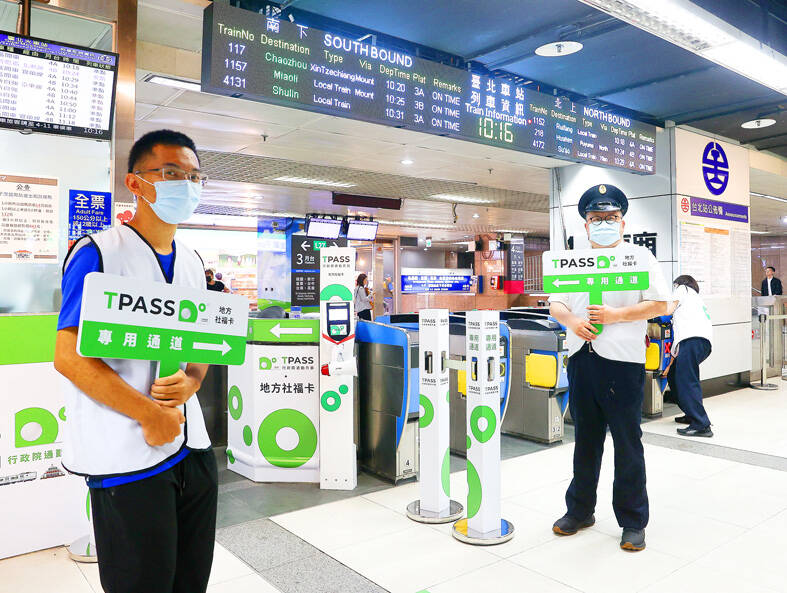The government’s TPass monthly mass public transportation program launched yesterday in metropolitan areas with authorities saying that the true test of the system would be with greater passenger volumes tomorrow.
As of Friday, nearly 180,000 people had bought TPasses by adding value to their prepaid transit cards, including 71,551 people in the northern region, 18,221 in the central region and 90,203 in the southern region, the Ministry of Transportation and Communications said.
Moreover, nearly 100,000 new TPasses — 74,917 in the north, 16,912 in the central region and 8,282 in the south — had been purchased, the ministry said.

Photo: CNA
The passes are unavailable in eastern areas, as well as Hsinchu city and county, and outlying counties, it said.
In Taoyuan, as of noon yesterday, about 2,000 passengers boarded the Taoyuan Airport MRT using TPass, with the A1, A8 and A7 stations showing the most activity, Taoyuan Department of Transportation director-general Chang Hsin-fu (張新福) said.
A problem occurred at Taoyuan Railway Station, where senior citizen MRT cards were incompatible with TPass readers, Chang said, adding that station personnel resolved the issue by manually opening gates for people whose cards would not work.
The true test would be tomorrow’s rush times, he said.
TPass works with Taiwan Railways Administration (TRA), MRT, shared bike and many bus services in Keelung, Taipei, New Taipei City and Taoyuan, officials said.
The Taipei Department of Transportation said it expects more than 40,000 people to buy new TPass cards tomorrow and 340,000 by the end of the month.
TPass cannot be used for Puyuma Express, Taroko Express, EMU3000 and rail tour services, TRA deputy head of transportation operations Chen Jung-pin (陳榮彬) said.
The three TPass regions cover Taipei, New Taipei City, Taoyuan and Keelung for NT$1,200 per month; Taichung, and Miaoli, Nantou and Changhua counties for NT$699 for Taichung residents or NT$999 for non-Taichung residents; and Kaohsiung, Tainan and Pingtung County for NT$999 per month.
The TPass scheme was launched under the government’s NT$380 billion (US$12.2 billion) post-COVID-19 pandemic economic recovery package, which was passed by lawmakers on March 24.
Meanwhile, Kaohsiung’s monthly citywide NT$399 public transport pass was expanded yesterday to cover TRA services within city limits, the Kaohsiung Transportation Bureau said.
In related news, the Tourism Bureau launched the Taiwan Tour Buses program in collaboration with 22 tourism agencies providing 83 tour packages until the end of this year.
Every two people who buy a package can add a third person free of charge, the Tourism Bureau said, adding that the service is aimed at boosting domestic and international tourism.
Taiwan Tour Buses provides a tour guide, bus driver and meals depending on the package, said Tsai Tsung-sheng (蔡宗昇), deputy head of the Tourism Bureau’s domestic travel division.
The minimum number required for tour groups is kept low and some packages can be offered as guided tours for a single person, Tsai said.
The buses are designed to enable people to easily find lodging, dining, shopping and other transportation options, the Tourism Bureau said, adding that it hopes the program would facilitate the post-pandemic recovery of the tourism industry.
Additional reporting by Ting Yi

US President Donald Trump said "it’s up to" Chinese President Xi Jinping (習近平) what China does on Taiwan, but that he would be "very unhappy" with a change in the "status quo," the New York Times said in an interview published yesterday. Xi "considers it to be a part of China, and that’s up to him what he’s going to be doing," Trump told the newspaper on Wednesday. "But I’ve expressed to him that I would be very unhappy if he did that, and I don’t think he’ll do that," he added. "I hope he doesn’t do that." Trump made the comments in

Japanese footwear brand Onitsuka Tiger today issued a public apology and said it has suspended an employee amid allegations that the staff member discriminated against a Vietnamese customer at its Taipei 101 store. Posting on the social media platform Threads yesterday, a user said that an employee at the store said that “those shoes are very expensive” when her friend, who is a migrant worker from Vietnam, asked for assistance. The employee then ignored her until she asked again, to which she replied: "We don't have a size 37." The post had amassed nearly 26,000 likes and 916 comments as of this

Tourism in Kenting fell to a historic low for the second consecutive year last year, impacting hotels and other local businesses that rely on a steady stream of domestic tourists, the latest data showed. A total of 2.139 million tourists visited Kenting last year, down slightly from 2.14 million in 2024, the data showed. The number of tourists who visited the national park on the Hengchun Peninsula peaked in 2015 at 8.37 million people. That number has been below 2.2 million for two years, although there was a spike in October last year due to multiple long weekends. The occupancy rate for hotels

A cold surge advisory was today issued for 18 cities and counties across Taiwan, with temperatures of below 10°C forecast during the day and into tonight, the Central Weather Administration (CWA) said. New Taipei City, Taipei, Taoyuan and Hsinchu, Miaoli and Yilan counties are expected to experience sustained temperatures of 10°C or lower, the CWA said. Temperatures are likely to temporarily drop below 10°C in most other areas, except Taitung, Pingtung, Penghu and Lienchiang (Matsu) counties, CWA data showed. The cold weather is being caused by a strong continental cold air mass, combined with radiative cooling, a process in which heat escapes from